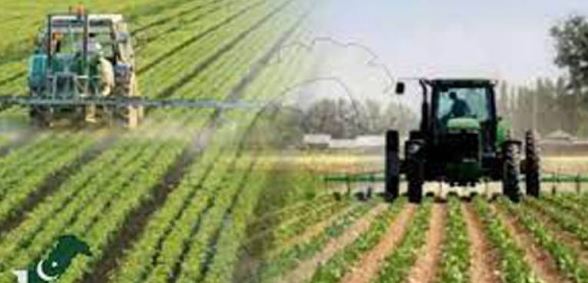Planning Ministry bolsters efforts for agriculture sector projects

ISLAMABAD, Oct 29 (DNA): Considering the agriculture sector’s paramount
importance, already identified as a priority by the Special Investment
Facilitation Council (SIFC), the Ministry of Planning, Development, and
Special Initiatives has intensified its efforts to execute
agriculture-related projects.
In the current fiscal year, several projects worth billions of rupees
were allocated for the agriculture sector under the Public Sector
Development Program (PSDP 2023-24) to tap huge potential in the
agriculture sector, according to the Planning Ministry.
Pakistan has vast potential for foreign investment in the field of
agriculture as the country is a semi-industrialized economy with a
well-integrated agricultural sector that contributes 22.9% to Gross
Domestic Product (GDP) and creates 37.4% of jobs, ensures food security
and provides raw materials for industries.
While gearing up the efforts, the Planning Ministry asked the ministries
concerned to accelerate the implementation so that the projects could be
completed timely, especially at a time when the SIFC took the lead and
agriculture was the top priority besides the other key sectors.
The SIFC was established earlier this year to attract foreign and local
investments while targeting five key areas which include Agriculture,
Defence Production, Mining/Minerals, Information Technology and
Telecommunication and Energy.
The projects include Cage Culture Cluster Development Project,
Commercialization of Potato Tissue Culture Technology in Pakistan,
Establishment of consumer-sourcing seed authenticity system and
Strengthening of Labs of FSC&RD; Establishment of Plant Breeders Rights
Registry and Strengthening of DUS Examination System; Establishment of
Seed Certification Services in Southern Balochistan; National Oilseed
Enhancement Program; National Peste Des Petits Ruminants (PPR)
Eradication Programme: Phase 1 – Risk Based PPR Control In Sheep and
Goats of Pakistan; National Program for Enhancing the Command Area in
Barani Areas of Pakistan; National Program for Improvement of
Watercourses in Pakistan – Phase II; Pilot Shrimp farming Cluster
Development; Productivity Enhancement of Rice; Productivity Enhancement
of Sugarcane; Productivity Enhancement of Wheat, Promoting Research for
Productivity Enhancement in Pulses, Promotion of Olive cultivation on
commercial scale in Pakistan – Phase II; Promotion of Trout Farming in
Northern Areas of Pakistan; Sino-Pak Agricultural Breeding innovations
Project for Rapid Yield Enhancement; Water Conservation in Barani Areas
of KP; Locust Emergency and Food Security Project; Mainstreaming of MARC
for the promotion of high value agriculture in Gilgit-Baltistan;
Pakistan- Korea Joint Program on Certified Seed Potato Production System
and Professional Capacity Building in Agriculture TVET National reforms
programe.
Prime Minister’s Initiatives for Green Revolution 2.0 worth Rs 5000
million is a landmark project initiated to address the key constraints
to the productivity of agriculture.
The government emphasized on promotion of technology to reduce
post-harvest losses, value addition for grain, fruits and vegetables,
productivity enhancement of major crops, engagement of women and youth
in agriprenure, agri-business and to promote and support agricultural
research.
It is noted that the Green Revolution played a key role in the country’s
economy back in the 1960s while saving millions of people from famine.
Under this initiative, it will contribute to the national economy.
Pakistan’s potential to export food products is limited by strict
international standards.
Keeping in view the significance of fruits and vegetables a
“Horticulture Support Program” is another project being started at
Rs1000 million to address the key constraints to horticulture crops.
This project has been designed to reduce on-field and post-harvest
losses of selected fruits & vegetables and to integrate and strengthen
horticultural value chains by demonstrating of value-adding technologies
at every step of the value chain through public-private partnerships.
Similarly, another project “Prime Minister’s National Programme for
Solarization of Agricultural Tubewells in Pakistan” worth Rs 377,017m is
being started to convert 100,000 numbers of tube wells, including 50,000
numbers of diesel and 50,000 numbers of electric tube wells into solar
through this scheme across Pakistan in three years.
Furthermore, the government has already established a Land Information
and Management System, Center of Excellence (LIMS-CoE) to improve modern
agro-farming by utilizing more than 9 million hectares of uncultivated
state land.
The main goals of the center included consolidation and reclamation of
uncultivated wasteland, optimal decision-making regarding what and where
to grow, creation of a master plan for modern farming, adoption of
state-of-the-art agriculture management practices, the practice of
agro-intelligence for digital and precision agriculture, better
utilization of cutting-edge technology to enhance yield, and effective
decision support system.
The GIS-based LIMS will greatly improve the national agri-yield by
systemizing the digitization of agriculture, providing real-time
information to local farmers about soil, crops, weather, water resources
and pest monitoring through remote sensing and geospatial technologies
as well as minimizing the role of middlemen through the efficient
marketing system. DNA
Related News

Ramazan 2026: Zakat threshold set – check here
ISLAMABAD, FEB 17: The Ministry of Poverty Alleviation and Social Protection has officially set theRead More

Ambassador of Portugal visits Pir Khara Sharif
ISLAMABAD, FEB 17 /DNA/ – Ambassador Frederico Silva and Embassy team joined fellow ambassadors andRead More


Comments are Closed